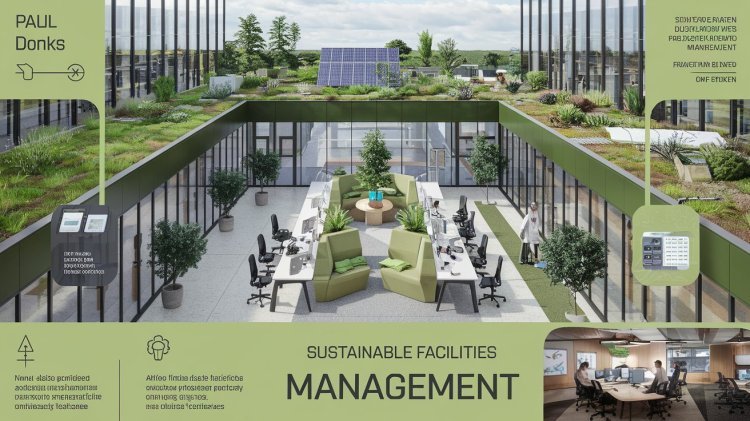Sustainable Facilities Management: The Future of Building Operations
Discover the importance of sustainable facilities management, focusing on energy efficiency, waste reduction, and green technologies for eco-friendly building operations.

As the globe moves toward more environmental responsibility, industries across the board are incorporating sustainable practices into their operations. Facilities management (FM) is one area where great progress is being made toward sustainability. Sustainable facilities management aims to reduce the environmental effect of building operations while ensuring optimal functionality and comfort for inhabitants. In this post, we'll look at the main components, benefits, and future of sustainable facilities management.
What is Sustainable Facilities Management?
Sustainable facility management is the activity of monitoring and maintaining buildings in an environmentally sustainable manner. It entails using resources efficiently, decreasing energy consumption, limiting waste, and ensuring that building activities have a low environmental impact. Sustainable FM encompasses a variety of factors, including energy management, water conservation, waste reduction, and promotion of renewable resource utilization.
Key Components of Sustainable Facilities Management
-
Energy Efficiency Energy consumption is one of the largest contributors to a building’s environmental impact. Sustainable FM focuses on reducing energy usage through efficient systems such as LED lighting, energy-efficient HVAC systems, and the installation of smart building technology to monitor and optimize energy usage.
-
Water Conservation Water management is another critical aspect. Sustainable FM practices involve the installation of low-flow fixtures, water-efficient landscaping, and the collection of rainwater for non-potable uses, such as irrigation.
-
Waste Reduction and Recycling Managing waste effectively is crucial for sustainable FM. Facilities management teams are implementing comprehensive recycling programs, reducing single-use plastics, and ensuring that waste is diverted from landfills. Sustainable waste management is a key aspect of reducing the environmental impact of facilities.
-
Sustainable Materials and Green Cleaning The materials used in building construction and maintenance play a significant role in sustainability. Using sustainable materials like recycled or reclaimed products helps reduce environmental impact. Additionally, eco-friendly cleaning products and practices ensure that the health of building occupants is maintained without compromising the planet’s well-being.
-
Smart Building Technology Advancements in technology have paved the way for smarter, more sustainable buildings. IoT (Internet of Things) devices, energy management systems, and AI-driven analytics enable facilities managers to track, optimize, and control energy use in real-time, reducing waste and improving efficiency.
Benefits of Sustainable Facilities Management
-
Cost Savings While the initial investment in sustainable technologies may seem high, the long-term cost savings are substantial. Lower energy and water bills, reduced waste disposal costs, and fewer maintenance issues contribute to a significant reduction in operational expenses.
-
Improved Employee Productivity Employees working in sustainable, eco-friendly environments often experience higher satisfaction and productivity. Well-lit, well-ventilated, and green buildings contribute to improved comfort and well-being, leading to fewer sick days and enhanced overall performance.
-
Regulatory Compliance Many regions are adopting stricter regulations concerning building operations and sustainability. Implementing sustainable facilities management practices helps organizations stay compliant with local and international environmental regulations, avoiding penalties and enhancing reputation.
-
Enhanced Corporate Image A commitment to sustainability enhances a company’s image and attracts environmentally-conscious clients and employees. Green building certifications, such as LEED (Leadership in Energy and Environmental Design), further validate an organization’s commitment to sustainability.
Request A Free Demo! https://axonator.com/request-for-demo/
The Future of Sustainable Facilities Management
The future of sustainable facilities management looks bright, with technology playing an important role in fostering innovation. As smart buildings evolve, real-time data analytics will play an increasingly important role in predicting and optimizing resource usage. Artificial intelligence will help to streamline processes, making buildings more self-sufficient and environmentally benign. Furthermore, the incorporation of renewable energy sources, such as solar and wind, will become more prevalent in sustainable FM practices.
Furthermore, as organizations face increasing pressure to decrease their carbon footprint, sustainability in facilities management will become not only a preference, but a need. As a result, enterprises will continue to seek for FM suppliers who promote environmentally friendly solutions, ensuring that sustainability is integrated into their building operations.
Sustainable facilities management is no longer a fad; it is a business imperative that leads to long-term savings, increased employee happiness, and a healthier environment. Facilities managers can keep their buildings functional, environmentally friendly, and cost-effective by implementing energy-efficient techniques, eliminating waste, and leveraging smart technologies. As enterprises around the world prioritize sustainability, facilities management will play an increasingly important role in determining the future of greener, smarter, and more efficient buildings.
What's Your Reaction?















